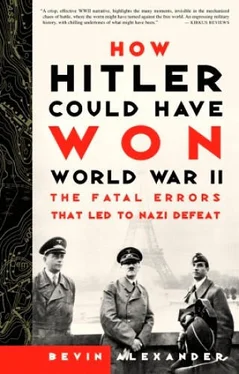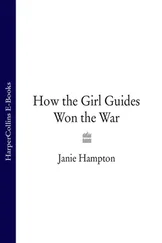Three defensive rings encircled the city, the last a small circle around the Chancellery and other main government buildings in the center. Forces included 9th Army, elements of 3rd and 4th Panzer Armies, and Volkssturm units of overage untrained men and Hitler Youth boys. Red Army forces occupied outlying areas of Berlin on April 21, and completely surrounded the city on April 25. The battle was largely a huge moppingup operation. Russians destroyed pockets of resistance with artillery fire, or bypassed them until supplies ran out.
Only in the center around the government buildings was resistance fierce. The Russians abandoned efforts to overrun the center with tanks when German infantry were able to get close enough in the heavily built-up area to destroy armor with antitank weapons. The Russians also found it difficult to deploy artillery in the close confines of the city. They used cannons where they could, but relied mainly on mortars and rockets. Small combat teams cleared the center city block by block—300 blocks in all, every house or building taken by storm. It was a slow process, but thorough. Especially heavy fighting raged in the subway and underground communications facilities.
Before the fighting started, on April 15, Hitler’s mistress for twelve years, Eva Braun, thirty-five years old, arrived in Berlin to join him in a wedding and her ceremonial death. Eva Braun was a simple woman with no intellectual pretensions, but she was determined to share Hitler’s end.
So also was Goebbels and his wife. They and their six children (the oldest twelve years old) moved into the Chancellery bunker.
Hitler sorted out his papers, and sent one of his adjutants up to the garden to burn those he wanted destroyed. He ordered Keitel and Jodl to go south and take direct command of the remaining armed forces.
Meantime Göring arrived at Obersalzberg, and on April 23 sent Hitler a telegram proposing that he take over “total leadership of the Reich.” Hitler responded that Göring had committed high treason. Martin Bormann, Hitler’s sinister private secretary, got off a radiogram to SS headquarters in Berchtesgaden, and had Göring arrested. On April 28 Hitler received word through a BBC broadcast from London that Himmler was negotiating through Sweden to surrender all armies in the west to Eisenhower.
A few minutes later Hitler received word that the Russians were nearing the Potsdamerplatz, only a few hundred yards away, and would likely storm the Chancellery on the morning of April 30.
Hitler directed General Robert Ritter von Greim, whom he had named as Luftwaffe chief, along with Hanna Reitsch, a famous woman test pilot and admirer of Hitler, to leave the bunker, rally the Luftwaffe for a last attack on the Russians, and arrest Himmler as a traitor. Meanwhile he had Himmler’s chief liaison officer, Hermann Fegelein, taken up to the Chancellery garden and shot.
Hitler also married Eva Braun, and drew up his last will and testament. These two documents reveal that Hitler had learned nothing from his errors and from the disasters he had brought upon the world. He denied he had wanted war in 1939, and claimed it had been brought on by foreign leaders who were “of Jewish origin or worked for Jewish interests.” He placed the “sole responsibility” for all the deaths on the Jews.
Hitler held that honor required “a district or town” to be held “unto death,” thus showing he had learned nothing from the disasters he himself had brought on at Stalingrad and other places he ordered defended to the last.
He expelled Göring and Himmler from the Nazi party and their offices, and appointed Admiral Karl Dönitz as president of the Reich and supreme commander, enjoining him to resist “international Jewry.”
The time was now 4 A.M. on Sunday, April 29, 1945. Hitler called in Goebbels and others in the bunker to witness his signatures. He then drew up his will, handing over to his relatives any property he might possess, and adding: “My wife and I choose to die in order to escape the shame of overthrow or capitulation. It is our wish that our bodies be burned immediately.”
Hitler now went to bed, exhausted. Above ground Russian artillery shattered buildings at point-blank range only yards from the Chancellery. A pall of smoke and dust hung over the city.
In the afternoon, news came in that Italian partisans had shot Mussolini and his mistress, Clara Petacci, near Lake Como and that their bodies had been strung up by their heels on lampposts in Milan. Soon thereafter, Hitler poisoned his favorite Alsatian dog, Blondi, and gave his two remaining women secretaries capsules of poison to take if they wished when the Russians broke in. About 2:30 A.M. on April 30 Hitler said good-bye in the dining area to twenty persons of the bunker staff, mostly women.
A bizarre event now took place. Tension had been building to such a height that several persons went into the canteen and began to dance. The party got so noisy that word came from the Fuehrer’s quarters asking for quiet. But the partygoers, at last released from Hitler’s control, frolicked all through the night.
At noon on April 30 word reached the bunker that the Russians were at the eastern end of the Tiergarten and had broken into the Potsdamerplatz. They were just a block away. Hitler’s chauffeur, on orders from below, delivered 180 liters of gasoline to the Chancellery garden. Hitler fetched his bride, Eva, and they made their final good-byes to Goebbels and a few others.
Hitler and Eva retired to their rooms. Goebbels, Bormann, and a few others waited in the passageway. In a few moments they heard a revolver shot. They waited for a second shot, but none came. They entered the Fuehrer’s quarters. Adolf Hitler’s body sprawled on the sofa, dripping blood. He had shot himself in the mouth. Eva Braun lay beside him. She had taken cyanide poison, and had not used a pistol. It was 3:30 P.M. on Monday, April 30, 1945—twelve years and three months since Hitler had become chancellor.
As Russian shells screamed and exploded in the immediate environs, their bodies were brought to the garden above, and Adolf and Eva Braun Hitler were consumed in a funeral pyre.
The Third Reich survived for seven days.
Early on the evening of May 1, Goebbels and his wife ordered a physician to give their children lethal injections. That done, they mounted the stairs to the garden. There, at their request, an SS orderly shot them both in the back of the head. SS men poured gasoline on their bodies and set them on fire, but the cremation was incomplete, and the Russians found the charred remains the next day.
Around 9 P.M. on May 1, about 500 survivors of Hitler’s headquarters, mostly SS men, tried to get away, walking along the subway tracks from the station under the Wilhelmplatz, opposite the Chancellery, to the Friedrichstrasse railway station, then crossing the Spree River and slipping through the Russian lines to the north. A good many got through, but not Martin Bormann. He was either killed or took poison to avoid capture.
On March 4 the German high command surrendered to Montgomery all forces in northwest Germany, Denmark, and Holland. The next day Kesselring’s Army Group G, comprising the armies north of the Alps, capitulated.
On May 5, Admiral Hans von Friedeburg, now navy commander, arrived at Eisenhower’s headquarters at Reims, France, to negotiate a surrender. General Jodl came the next day, hoping to draw out proceedings long enough for hundreds of thousands of German troops and refugees to move west far enough to surrender to the western Allies instead of the Russians.
But Eisenhower would brook no delay, and at 2:41 A.M. on May 7, Friedeburg and Jodl signed Germany’s unconditional surrender, effective at midnight May 8, 1945.
Himmler, captured by the British, bit down on a cyanide capsule and died. Nineteen of the worst Nazis were convicted at Nuremberg of war crimes. Seven drew prison terms, the remainder were sentenced to hang, including Ribbentrop, Keitel, Jodl, and Göring, though Göring cheated the hangman by two hours. Someone had slipped a poison vial into his cell, and he was dead when the guards came for him.
Читать дальше


![Джонатан Димблби - Barbarossa - How Hitler Lost the War [calibre]](/books/385421/dzhonatan-dimblbi-barbarossa-how-hitler-lost-the-w-thumb.webp)









